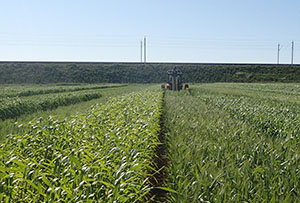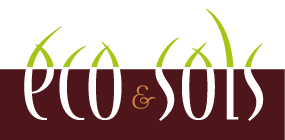 Solutions for improving agroecosystem and crop efficiency for water and nutrient use
Solutions for improving agroecosystem and crop efficiency for water and nutrient use
SolACE's overarching goal is to help European agriculture facing the challenge to deal with more frequent combined limitations of water and nutrients in the coming decades, through the design of novel crop genotypes and agroecosystem management innovations to improve water and nutrient (i.e. N and P) use efficiency.
To achieve this goal, SolACE will focus its activities on three major European crops
- potato
- bread
- durum wheat
- and will identify the :
- optimum combinations of above- and below-ground traits for improving resource use efficiency,
- best-performing genotypes under combined water and N or P stresses
- novel practices that make better use of plant-plant and plant-microbe interactions to access water, N and P resources in conventional, organic and conservation agriculture.
SolACE will implement a double interactive innovation loop, based on agroecosystem management and breeding strategies, and will imply the engagement of diverse end-users, across the production chain, from farmers and farm advisors to NGOs, SMEs and larger industries in the agri-business sector, through the SolACE consortium and a range of stakeholders' events.
The tested innovations will include crop genotype mixtures, legume-based crop rotations and cover crops, microbial inoculants, as well as improved decision support systems and hybrids or products from genomic selection and participatory evolutionary breeding schemes.
SolACE will implement complementary approaches, from data mining, modelling, phenotyping in high throughput platforms and field conditions, to experiments in research stations and farmers' networks in contrasted pedo-climatic zones.
Through the co-design and co-assessment with the end-users of the selected novel breeding and management strategies to increase the overall system resource use efficiency, the findings of SolACE will be deemed acceptable and readily available for dissemination to a broad spectrum of stakeholders, including policy-makers.
Date
2017-2022
Partners
- Inra - UMR Eco&Sols, Agap, Lepse Montpellier, AgroEcologie Dijon et GDEC Clermont-Ferrand
- AIT - Austrian Institute of Technology GmbH Austria
- CREA - Consiglio per la Ricerca in Agricoltura e l'Analisi dell 'Economia Agraria Italy
- FiBL - Forschungsinstitut für Biologischenlandbau Stiftung Switzerland
- JHI - The James Hutton Institute United Kingdom
- KU - Kobenhavns Universitet Denmark
- SU - Sabanci Universitesi Turkey
- SLU - Sveriges Lantbruksuniversitet Sweden
- UCL - Université catholique de Louvain Belgium
- UE - Universidade de Evora Portugal
- UHO - Universitaet Hohenheim Germany
- UNEW - University of Newcastle upon Tyne United Kingdom
- UPM - Universidad Politecnica de Madrid Spain
- Agroscope - Eidgenoessisches Departement für Wirtschaft, Bildung und Forschung Switzerland
- Arvalis - Arvalis Institut du végétal France
- Con.Cer - Con.Cer. Societa' Cooperativa Agricola Italy
- DCM - De Ceuster Meststoffen Belgium
- ECAF - European Conservation Agriculture Federation Belgium
- IT - Inra Transfert S.A. France
- LEAF - Linking Environment And Farming United Kingdom
- ÖMKi - Ökologiai Mezogazdasagi Kutatointezet Kozhasznu Nonprfit KFT Hungary
- Solynta - Ontwikkelingsmaatschappij Het Idee Netherlands
- SP -Sourcon-Padena GMBH & CO KG Germany
- Syngenta - Syngenta France
- Agrobiota - Agrobiota Germany
Funds
Commission Européenne – H2020
Contact and Informations
Philippe Hinsinger, UMR Eco&Sols, Inra Montpellier
email :







